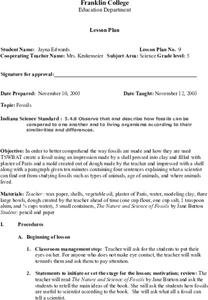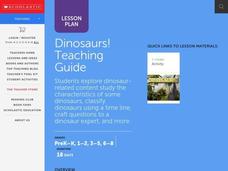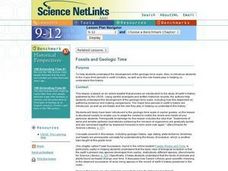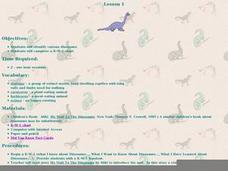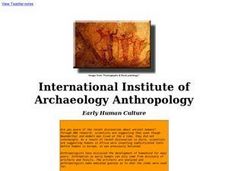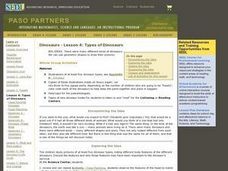Curated OER
Evidence of Change
Students identify evidence of change in species using fossils, anatomical similarities, and embryology. They identify homologous structures and arrange the steps of fossil formation. Students complete a group of selection of organisms...
Curated OER
Dinosaurs
Students research and identify the characteristics of a variety of dinosaurs. They participate in a class discussion about dinosaurs, analyze and examine fossils, and conduct research using a variety of sources to write and present a...
Curated OER
Fossils
Fifth graders create a fossil using an impression made with a shell pressed into clay and filled with plaster of Paris and a mold made out of dough and impressed with a shell. They also will receive a paragraph which contains four...
Curated OER
The Bare Bones Of Fossils
Studentsare able to understand the three ways foosils were created. They are able to make a reconstruction of a puzzle or draw a picture based on cluses and limited pieces of the puzzle or animal. Students are able to explain how fossils...
Curated OER
Science NetLinks: Fossils and Geologic Time
High schoolers investigate the development of the geologic time scale. Also, to introduce them to the major time periods in earth's history, as well as to the role fossils play in helping us understand this history.
Curated OER
Fossils And Migration Patterns in Early Hominids
Students plot the general distribution of major fossil hominid taxa on a small black and white world map using data provided. They infer a continent of origin and likely path of migration using a worksheet guide and small group discussion.
Curated OER
Dinosaurs
Students will develop goals for inquiry. They will also improve content area reading and research skills. The context of studying dinosaurs will help learners to distinguish from organisms that live presently and those from the past...
Curated OER
Fossils and Geologic Time
Students explore the development of the geologic time scale. They examine the major time periods in earth's history. Students discuss the role fossils play in helping us understand history.
Curated OER
Shells on the Mountain Top?
Young scholars work in groups to remove fossils from sediments, classifying as many organisms and parts of organisms as possible into major groups. They study the data from each formation and make conclusions about the types of...
Curated OER
Paleontologist: Can You Dig It?
Students investigate what a paleontologist does. They participate in a dinosaur dig, write a story, and explore the Dinosaur Dig website to view and discuss photos of a real dinosaur dig.
Curated OER
Identifying Dinosaurs
Young scholars investigate basic information about dinosaurs. They listen to the book, "My Visit To the Dinosaurs," explore various websites, take an online quiz, and play an online dinosaur game.
Curated OER
Earth's History
Sixth graders investigate how fossils are formed. They analyze a photo of the Grand Canyon, and create a fossil cast and mold using plaster of paris and shells.
Curated OER
Earth's History
Seventh graders study the law of superposition by creating models of fossils in layers of rock. They examine how fossils are usually found in sedimentary rock which leads to the study of geologic history in those rocks.
Curated OER
International Institute of Archaeology an Anthropology
Students research early humans and their cultures. They conduct Internet research, discuss their findings with their group, evaluate the information provided by artifacts, and create a report to present to a simulated archaeology institute.
Curated OER
Fossilworks
Students research fossils and fossil formation. They explain how fossils are formed, identify fossil formations and use casting plaster to produce fossil replicas.
Curated OER
Ocean Life
Young scholars examine the fossil remains of ancient sea creatures. They create casts of fossils and identify how sea fossils are formed and consider what type of information fossils can give to scientists.
Curated OER
BIRDS OF A FEATHER
Students observe and identify characteristics of artifacts and fossils; explain how artifacts and fossils are used to explore the past; and identify ways that Native Americans prepared food and made tools
Curated OER
Making Sedimentary Rocks
Students make models of sedimentary rock layers to explain how rocks form layers and represent ancient environments. Layers of sediment and fossils are added together to simulate the environment and connections to sedimentary rocks are...
Curated OER
Chesapeake Bay Fossils/Geology
Students define and investigate paleontology, research geological history of the Chesapeake Bay, review geological time line, and identify fossils of the Chesapeake Bay.
Curated OER
Be a "Fossil Detective" an Effective Tool in Earth Science Education
Students examine the geological time scale: the Earth is ancient; time can be divided into periods based on its fossil content.
Curated OER
White Glue Fossils: Casts, Molds, and Impressions
Students make impressions and molds in clay and them make casts with glue. After the glue dries students remove their fossils.
Curated OER
Types of Dinosaurs
Learners complete puzzles of dinosaurs. They compare each piece of the puzzle to a fossil and simulate a scientist's role in learning about dinosaurs.
Curated OER
Fossils
Students act as paleontologists to discover who a mystery guest to the classroom was. They do not know the identity of the guest but infer the identity from items left behind in the classroom. They make inferences from dinosaur fossils.
Curated OER
A Peek at the Past: Gradualism vs. Punctuated Equilibria
Students consider two sets of simulated fossils (caminalcules) that are provided as cutouts. They arrange them on two time scales. One set produces a visual example of gradualism, the other shows punctuated equilibria.




